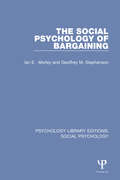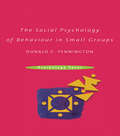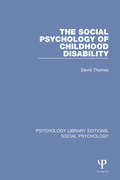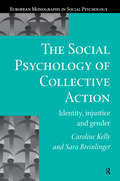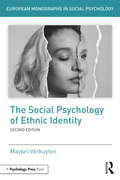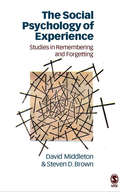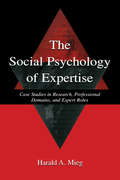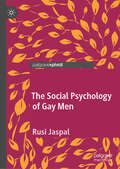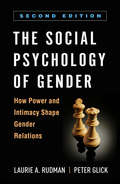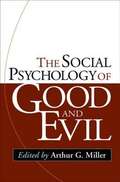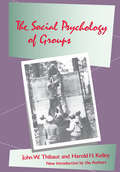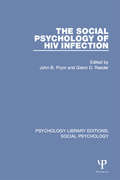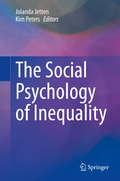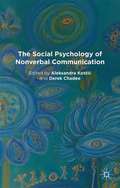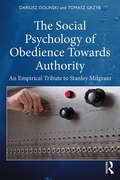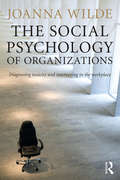- Table View
- List View
The Social Psychology of Bargaining (Psychology Library Editions: Social Psychology)
by Ian Morley Geoffrey StephensonOriginally published in 1977, this book deals with the social psychological factors which influence the process of bargaining. It examines the structure behind the process, by which it can be analysed and better understood. Particular attention is paid to the character of negotiations in which agreements are obtained.
The Social Psychology of Behaviour in Small Groups (Psychology Focus Ser.)
by Donald C. PenningtonThe Social Psychology of Behaviour in Small Groups covers theories of group behaviour and their application in organizational psychology. Topics include the structure and formation of groups and the roles that individuals play within groups, as well as more applied areas such as co-operation and conflict, teamwork, leadership and decision-making in small groups.Throughout the book theory, research and concepts are applied to real-life and everyday social behaviour. The book is well illustrated and includes many mental exercises to engage the reader. Donald Pennington has provided a lively, accessible and systematic text suitable for undergraduates studying social psychology and those studying organizational psychology on psychology and business studies courses.
The Social Psychology of Childhood Disability (Psychology Library Editions: Social Psychology)
by David Thomas‘Some years ago I read the phrase "the spontaneous revulsion to the deformed". The phrase seemed to be both potent and provocative: Was there a spontaneous revulsion to disabilities in children or did such conditions evoke a more compassionate response?’ Originally published in 1978, the problems of the disabled were no longer confined to the medical and educational professionals, but had become the concern of the community as a whole. Using terminology very much of the time, the author shows how attitudes towards different kinds of disability had developed at the time; they varied both regionally and by social class, sometimes calling into question the accepted ‘facts’ about the distribution of a particular condition. Most importantly, the author examines these attitudes together with many other social and psychological factors in relation to their impact on the social behaviour and developing self-image of the disabled child. It becomes clear that the dangers of categorization and the difficulties in overcoming stigma have a profound influence on the education and socialization of disabled children. This book will be of historical interest to students and teachers of psychology, education, social work and rehabilitation; and it will provide insight for parents and all those concerned with the care and development of the disabled child about how far we have come.
The Social Psychology of Collective Action: Identity, Injustice, And Gender (European Monographs in Social Psychology)
by Caroline Kelly Sara BreinlingerIn recent years there has been a growth of single-issue campaigns in western democracies and a proliferation of groups attempting to exert political influence and achieve social change. In this context, it is important to consider why individuals do or don't get involved in collective action, for example in the trade union movement and the women's movement.Social psychologists have an important contribution to make in addressing this question. The social psychological approach directly concerns the relationship between the individual and society and a number of theories have been developed in the field, particularly by contemporary European researchers. Yet, surprisingly, there has never been, until now, a concerted attempt to bring these various strands of research together in a coherent, detailed presentation of the social psychological approach to collective action.The authors of The Social Psychology of Collective Action review and integrate a number of theories developed in this field as well as presenting their own original research and data. The research discussed in the book ranges over a number of different contexts, with a particular focus on women's groups organizing around issues of gender. Questions addressed include: why do women get involved in women's groups? What part is played by experiences of discrimination in the family and in the workplace? What are the benefits of group involvement? How are feminist activists perceived by others who choose not to get involved? Findings from questionnaires and interviews are integrated with contemporary social psychological theory, especially social identity theory.
The Social Psychology of Crime: Groups, Teams and Networks (Offender Profiling Series #5)
by Laurence AlisonCrime is always part of a social process. In many cases that process determines the form the crime takes. In this ground-breaking book, a wide range of crimes are examined in terms of the social psychological processes that influence the participants and their relationships with each other. Crimes as diverse as fraud and hostage taking are examined from a range of social science perspectives, including broad anthropological perspectives on differences in the structure of criminal cultures as well as the detailed consideration of the roles offenders play in groups and teams of criminals. This book opens up a new area of empirical study of relevance to students of crime as well as law enforcement officers. It will also be of value and interest to all those social scientists who wish to understand how their disciplines can contribute more effectively to the investigation of crime.
The Social Psychology of Eating
by Patrizia Catellani Valentina CarforaOur eating decisions are guided by several psychological dimensions: cognitive, emotional, value-based, social, and behavioural. The social psychology of eating helps us understand these dimensions and how we can promote healthy and sustainable eating to improve people's wellbeing. What is most important in deciding what we want to eat? What drives people to go vegan? Do we tend to eat more when we are nervous? Does it change our behavior when we sit at the table with others? Why do we put off starting the diet until the next week? How does online and offline communication influence our eating behaviour? Is it possible to help people change their eating habits thanks to artificial intelligence? These and other questions are answered in this book, with up-to-date literature references and pointers to the most promising developments in the field. An essential text for undergraduate and graduate students, as well as researchers in the fields of psychology and nutrition.
The Social Psychology of Ethnic Identity (European Monographs in Social Psychology)
by Maykel VerkuytenIn contrast to other disciplines, social psychology has been slow in responding to the questions posed by the issue of ethnicity. The Social Psychology of Ethnic Identity, Second Edition, demonstrates the important and diverse contribution that social psychology can make. Comprehensively updated to include the latest research on dual and multiple identities, mutual links between sense of ethnic identity and social contexts, and the development of ethnic identity in adolescence, this new edition now also features research from non-European cultural contexts, including Turkey, Mauritius and Myanmar. The book shows, on the one hand, that social psychology can be used to develop a better understanding of ethnicity and, on the other hand, that increased attention to ethnicity can benefit social psychology. By filling in theoretical and empirical gaps, Maykel Verkuyten brings an original approach to subjects such as: ethnic minority identity – place, space and time; hyphenated identities and duality; and self-descriptions and the ethnic self. Featuring the latest theoretical ideas and research, the combination of diverse approaches to this burgeoning field make this book invaluable reading for students of psychology and related disciplines, as well as researchers and professionals.
The Social Psychology of Everyday Life
by Michael ArgyleIs psychology good for our health? What is the effect of class on social behaviour? In this comprehensive and fully up-to-date accoung of the psychology of everyday life, Michael Argyle looks at the most interesting and practically important areas of social psychology. He takes social psychology out of the laboratory into real-life settings and helps us to understand the world in which we live. He covers many of the pressing concerns of the day - conflict and aggression, racial prejudice, social class, relationships, health, happiness - and emphasisies the practical applications of social psychology.
The Social Psychology of Everyday Politics
by Caroline Howarth Eleni AndreouliThe Social Psychology of Everyday Politics examines the ways in which politics permeates everyday life, from the ordinary interactions we have with others to the sense of belonging and identity developed within social groups and communities. Discrimination, prejudice, inclusion and social change, politics is an on-going process that is not solely the domain of the elected and the powerful. Using a social and political psychological lens to examine how politics is enacted in contemporary societies, the book takes an explicitly critical approach that places political activity within collective processes rather than individual behaviors. While the studies covered in the book do not ignore the importance of the individual, they underscore the need to examine the role of culture, history, ideology and social context as integral to psychological processes. Individuals act, but they do not act in isolation from the groups and societies in which they belong. Drawing on extensive international research, with contributions from leaders in the field as well as emerging scholars, the book is divided into three interrelated parts which cover: The politics of intercultural relations Political agency and social change Political discourse and practice Offering insights into how psychology can be applied to some of the most pressing social issues we face, this will be fascinating reading for students of psychology, political science, sociology and cultural studies, as well as anyone working in the area of public policy.
The Social Psychology of Experience: Studies in Remembering and Forgetting (Inquiries in Social Construction series)
by Steven Brown David Middleton`A smart, thoughtful, and well-written book that takes social memory studies in a bold new direction and will attract an audience from across the social sciences for years to come' - Theory & Psychology What informs the process of remembering and forgetting? Is it merely about our capability to store and retrieve experiences in a purely functional sense? What about 'collective memories', not just those of the individual - how do these manifest themselves in the passages of time? The authors present a new, fascinating insight into the social psychology of experience drawing upon a number of classic works (particularly by Frederick Bartlett, Maurice Halbwachs & Henri Bergson) to help develop their argument. The significance of their ideas for developing a contemporary psychology of experience is illustrated with material from studies focused on settings at home and at work, in public and commercial organizations where remembering and forgetting are matters of concern, involving language and text based communication, objects and place. As their argument unfolds, the authors reveal that memories do not solely reside in a linear passage of time, linking past, present and future, nor do they solely rest within the indidvidual's conciousness, but that memory sits at the very heart of 'lived experience'; whether collective or individual, the vehicle for how we remember or forget is linked to social interaction, object interaction and the different durations of living that we all have. It is very much connected to the social psychology of experience. This book is written for advanced undergraduate, masters and doctoral students in social psychology. However, it will also be of particular value on courses that deal with conceptual and historical issues in psychology (in cognate disciplines as well) and supplmentary reading in cognitive science.
The Social Psychology of Expertise: Case Studies in Research, Professional Domains, and Expert Roles (Expertise: Research and Applications Series)
by Harald A. MiegThe Social Psychology of Expertise offers an integrative perspective to the analysis of experts and expertise in organizations, social roles, management, etc. It is the first book to link the psychology of expertise to sociology, particularly the sociology of professions. By examining the converging elements of both approaches and investigating the conditions of interactions with all types of experts, The Social Psychology of Expertise makes it possible to understand the market form of expert services. This book: *introduces the expert role approach--a new and encompassing view on the role of experts and how to use the experts' expertise in organizations, financial markets, and environmental issues; *enhances a mutual understanding between the psychology of expertise and the sociology of professions (for students, as well as scholars); *provides a helpful understanding of dealing with experts in the context of organizational behavior; *shows how we can make proper use of the experts' expertise in management and planning; *demonstrates how the role of experts influences volatility in financial markets; and *defines the limits of human expertise in predicting climate change.
The Social Psychology of Gay Men
by Rusi JaspalThis book focuses on the social psychological aspects of gay men’s lives and provides a cutting-edge examination of topics including sexual orientation, sexual behavior, identity, relationships, prejudice, and health. The Social Psychology of Gay Men forces us to re-think existing theory and research, much of which has taken heterosexuality for granted. With identity process theory at its heart, this book advocates a social psychology of gay men which incorporates three levels of analysis – the psychological, interpersonal and societal. The book promises not only a deeper understanding of gay men’s lives but also pathways for enhancing wellbeing, intergroup relations and equality in this key population. This illuminating and thought-provoking text is an invaluable resource not only for psychologists, but for students, scholars and practitioners working in the area of gay men’s life.
The Social Psychology of Gender, Second Edition: How Power and Intimacy Shape Gender Relations (Texts In Social Psychology Ser.)
by Peter Glick Laurie A. RudmanNoted for its accessibility, this text--now revised and updated to reflect a decade of advances in the field--examines how attitudes and beliefs about gender profoundly shape all aspects of daily life. From the schoolyard to the workplace to dating, sex, and marriage, men and women alike are pressured to conform to gender roles that limit their choices and impede equality. The text uses real-world examples to explore such compelling questions as where masculine and feminine stereotypes come from, the often hidden ways in which male dominance is maintained, and how challenging conventional romantic ideals can strengthen heterosexual relationships. New to This Edition *Chapter on the sexualization of women's bodies, and resistance to it (including #MeToo). *Chapter on the harmful effects of "real man" ideology. *Numerous new examples drawn from current events. *Updated throughout with the latest theories, research, and findings.
The Social Psychology of Good and Evil
by Arthur G. MillerThis compelling work brings together an array of distinguished scholars to explore key concepts, theories, and findings pertaining to some of the most fundamental issues in social life: the conditions under which people are kind and helpful to others or, conversely, under which they commit harmful, even murderous acts. Covered are such topics as the complex interaction of individual, societal, and situational factors underpinning good or evil behavior; the role of guilt and the self-concept; and issues of responsibility and motivation, including why good people do bad things. The volume also examines whether aggression and violence are inescapable aspects of human nature, and how cooperative interaction can break down stereotyping and discrimination.
The Social Psychology of Good and Evil, Second Edition
by Arthur G. MillerThis timely, accessible reference and text addresses some of the most fundamental questions about human behavior, such as what causes racism and prejudice and why good people do bad things. Leading authorities present state-of-the-science theoretical and empirical work. Essential themes include the complex interaction of individual, societal, and situational factors underpinning good or evil behavior; the role of moral emotions, unconscious bias, and the self-concept; issues of responsibility and motivation; and how technology and globalization have enabled newer forms of threat and harm. New to This Edition *Many new authors; extensively revised with the latest theory and research. *Section on group perspectives, with chapters on bystanders to emergencies, remembering historical victimization, organizational dynamics, and globalization and terrorism. *Chapters on free will, conscious versus unconscious processes, media violence, dehumanization, genocide, and sexual violence. *Chapters on false moral superiority, compassionate goals in relationships, and moral emotions in incarcerated offenders.
The Social Psychology of Groups
by John W. ThibautThis landmark theory of interpersonal relations and group functioning argues that the starting point for understanding social behavior is the analysis of dyadic interdependence. Such an analysis portrays the ways in which the separate and joint actions of two persons affect the quality of their lives and the survival of their relationship. The authors focus on patterns of interdependence, and on the assumption that these patterns play an important causal role in the processes, roles, and norms of relationships. This powerful theory has many applications in all the social sciences, including the study of social and moral norms; close-pair relationships; conflicts of interest and cognitive disputes; social orientations; the social evolution of economic prosperity and leadership in groups; and personal relationships.
The Social Psychology of HIV Infection (Psychology Library Editions: Social Psychology)
by John Pryor Glenn ReederIn the early 1980s we witnessed the birth of one of the most complex and perplexing social problems faced by modern society: the epidemic of infection with human immunodeficiency virus (HIV), which causes acquired immunodeficiency syndrome (AIDS). Originally published in 1993 this title looks at the social psychology surrounding HIV and AIDS. The organization of the volume centres upon two themes: The Theoretical Roots of Prevention and The Dilemma of the PWA (person with AIDS). The goal of this volume is not to evaluate previous attempts to answer these social problems, but to provide theoretical analyses of some of the basic sociopsychological processes that underlie the problems. Over 20 years on this is a snapshot of research into HIV and AIDS and attitudes of the time looking at social problems that are very much still with us.
The Social Psychology of Humor
by Madelijn StrickThis important new book provides a comprehensive analysis of humor from a social-psychological perspective, addressing questions about the use of humor and its effects in daily life. It examines the social psychology of humor on micro-level phenomena, such as attitudes, persuasion, and social perception, as well as exploring its use and effect on macro-level phenomena such as conformity, group processes, cohesion, and intergroup relations. Humor is inherently a social experience, shared among people, essential to nearly every type of interpersonal relationship. In this accessible volume, Strick and Ford review current research and new theoretical advancements to identify pressing open questions and propose new directions for future research in the social psychology of humor. The book explores fascinating topics such as humor in advertising, political satire, and the importance of a sense of humor in maintaining romantic relationships. It also examines how racist or sexist humor can affect personal and intergroup relations, and discusses how to confront inappropriate jokes. Offering new, precise, and operational conceptions of humor in social processes, this book will be essential reading for students and academics in social psychology, media, and communication studies.
The Social Psychology of Inequality
by Jolanda Jetten Kim PetersEconomic inequality has been of considerable interest to academics, citizens, and politicians worldwide for the past decade–and while economic inequality has attracted a considerable amount of research attention, it is only more recently that researchers have considered that economic inequality may have broader societal implications. However, while there is an increasingly clear picture of the varied ways in which economic inequality harms the fabric of society, there is a relatively poor understanding of the social psychological processes that are at work in unequal societies. This edited book aims to build on this emerging area of research by bringing together researchers who are at the forefront of this development and who can therefore provide timely insight to academics and practitioners who are grappling with the impact of economic inequality. This book will address questions relating to perceptions of inequality, mechanisms underlying effects of inequality, various consequences of inequality and the factors that contribute to the maintenance of inequality. The target audiences are students at advanced undergraduate or graduate level, as well as scholars and professionals in the field. The book fills a niche of both applied and practical relevance, strongly emphasizing theory and integration of different perspectives in social psychology. Given the broad interest in inequality within the social sciences, the book will be accessible to sociologists and political scientists as well as social, organizational, and developmental psychologists. The insights brought together in The Social Psychology of Inequality will contribute to a broader understanding of the far-reaching costs of inequality for the social health of a society and its citizens."This edited volume brings together cutting-edge social psychological research addressing one of the most pressing issues of our times – economic inequality. Collectively, the chapters illuminate why inequality has negative effects on individuals and societies, when and for whom these negative effects are most likely to emerge, and the psychological mechanisms that maintain inequality. This comprehensive volume is an essential read for those interested in understanding and ameliorating inequality." -Brenda Major, Distinguished Professor, Department of Psychological and Brain Sciences, University of California “This invaluable volume demonstrates the indispensable and powerful contribution that social psychologists can make to our understanding of societal inequality. For those outside of social psychology it provides a unique and comprehensive overview of what social psychology has to offer, and for social psychologists it is exemplary in demonstrating how to make a systematic contribution to the understanding of a hotly debated real-world issue. Scholars and students alike and from various disciplines will gain much from reading this fascinating and inspiring social psychological journey.”-Maykel Verkuyten, Professor in Interdisciplinary Social Science, University of Utrecht“The Social Psychology of Inequality offers a superb and timely social-psychological analysis of the causes and consequence of increasing wealth and income gaps. With its refreshingly international authorship, this volume offers profound insights into the cognitive and social mechanisms that help maintain, but potentially also to overcome, an economy that is rigged in favor of the wealthy. A new and stimulating voice, illustrating science in the service of a fairer and more democratic society.” -Anne Maass, Professor of Social Psychology, University of Padova“This volume assembles an impressive list of leading international scholars to address a timely and important issue, the causes and consequences of economic inequality. The approach to the topic is social psychol
The Social Psychology of Intractable Conflicts
by Eran Halperin Keren SharvitThis volume works explores a transferable theory of a specific social-psychological infrastructure, based on the work of Dr. Daniel Bar-Tal, that develops from cultures immersed in intractable conflicts. The book's approach to this issue is different from approaches that are predominant in social psychology. This is because an important inspiration of many scholars that contributed to the book is their everyday experience of living in a region where intractable conflict shapes the life's of everybody who lives there. On the basis of this experience and on the basis of extensive research, an elaborate theory of intractable conflict was developed that deals with the origin of such conflicts, the mechanisms that maintain them and the processes that may contribute to their peaceful solution. In light of recent research and developments, this volume demonstrates, analyzes and reviews the theory of a social-psychological infrastructure formed in societies with intractable conflicts. It explores the contents of these elements of the infrastructure, the processes through which they are acquired and maintained, their functions, the societal mechanisms that contribute to their institutionalization, as well as their role in the crystallization of social identity and development of a culture of conflict. By demonstrating that it can be applied to various kinds of intractable conflicts in various places of world, the volume argues that the theory is transferable and universal. Moreover, the volume aims to exhibit new connections and integrations between Bar-Tal's theories and other prominent theoretical frameworks in social and political psychology. Presenting both a comprehensive overview of works that have been influenced by Bar-Tal's theories and research, as well as a wide gate to future studies that will connect Bar-Tal's work to recent theoretical developments in related domains, Understanding the Social Psychology of Intractable Conflicts: Celebrating the Legacy of Daniel Bar Tal is an important text for all those interested in developing a sustainable, peaceful world.
The Social Psychology of Living Well (Sydney Symposium of Social Psychology)
by Roy F. Baumeister Joseph P. ForgasHow to live well and the search for meaning have long been of intense concern to humans, perhaps because Homo sapiens is the only species aware of its own mortality. In the last few decades, empirical psychology made a major contribution to this quest. This book surveys groundbreaking work by leading international researchers, demonstrating that social psychology is the core discipline for understanding well-being and the search for meaning. Basic conceptual and theoretical principles are discussed, drawing on philosophy, evolutionary theory and psychology, followed by a review of the role of purposeful, motivated activity and self-control in achieving life satisfaction. The role of emotional and cognitive processes and the influence of social, interpersonal and cultural factors in promoting a happy and meaningful life are discussed. The book will be of interest to students, practitioners and researchers in the behavioral and social sciences, as well as to laypersons for whom improving the quality of human life and understanding the principles of well-being are of interest.
The Social Psychology of Morality (Sydney Symposium of Social Psychology)
by Joseph P. Forgas Lee Jussim Paul A.M. Van LangeEver since Plato’s ‘Republic’ was written over two thousand years ago, one of the main concerns of social philosophy and later empirical social science was to understand the moral nature of human beings. The faculty to think and act in terms of overarching moral values is as much a defining hallmark of our species as is our intelligence, so homo moralis is no less an appropriate term to describe humans as homo sapiens. This volume makes a case for the pivotal role of social psychology as the core discipline for studying morality. The book is divided into four parts. First, the role of social psychological processes in moral values and judgments is discussed, followed by an analysis of the role of morality in interpersonal processes. The sometimes paradoxical, ironic effects of moral beliefs are described next, and in the final section the role of morality in collective and group behavior is considered. This book will be of interest to students and researchers in the social and behavioral sciences concerned with moral behavior, as well as professionals and practitioners in clinical, counseling, organizational, marketing and educational psychology where issues of ethics and morality are of importance.
The Social Psychology of Nonverbal Communication
by Derek Chadee Aleksandra KostićThe Social Psychology of Nonverbal Communication gathers together leading nonverbal communication scholars from around the world to offer insight into a range of issues within the nonverbal literature with the aim to rethink current approaches to the subject.
The Social Psychology of Obedience Towards Authority: An Empirical Tribute to Stanley Milgram
by Dariusz Dolinski Tomasz GrzybThis rich volume explores the complex problem of obedience and conformity, re-examining Stanley Milgram’s famous electric shock study, and presenting the findings of the most extensive empirical study on obedience toward authority since Milgram's era. Dolinski and Grzyb refer to their own series of studies testing various hypotheses from Milgram’s and others’ research, examining underlying obedience mechanisms as well as factors modifying the degree of obedience displayed by individuals in different situations. They offer their theoretical model explaining subjects’ obedience in Milgram’s paradigm and describe numerous examples of the destructive effect of thoughtless obedience both in our daily lives as well as in crucial historical events, stressing the need for critical thinking when issued with a command. Concluding with reflections on how to prevent the danger of destructive obedience to authority, this insightful volume will be fascinating reading for students and academics in social psychology, as well as those in fields concerned with complex social problems.
The Social Psychology of Organizations: Diagnosing Toxicity and Intervening in the Workplace
by Joanna WildeHealthy and successful organizations require the people who work within them to be happy, resilient and creative. Just as a human body is undermined if it suffers from sickness, so an organization can only function fully if the people who work within it feel engagement and well-being, and any toxic influences which shape or burden their working lives are resolved This important new title provides a much-needed overview not only of what it means for an organization to be weakened by pervasive psychological influences within the working environment, but also how this dysfunction can be addressed through psychological interventions. The book is split into three core sections: Toxicity and Dysfunction in the workplace, outlining structural, behavioural, emotional and cognitive sources of toxicity that undermine organizations Principles of the healthy workplace, outlining core concepts of belonging, contribution and meaning from which organizations in turn benefit Creating the healthy workplace, outlining a range of approaches to addressing organizational toxicity, including design thinking, positive psychology, and evidence-based approaches. Written by a practicing organizational psychologist, and including case studies to illustrate how toxicity at the micro level can impact upon wider organizational goals, the book draws on a wide range of literature to provide an accessible, focussed understanding of how the individual psychological experiences of working people can have wider consequences for an organization, and how interventions within that process can address these issues. It is ideal reading for students and researchers of occupational or organizational psychology, organizational behaviour, business and management and HRM.
